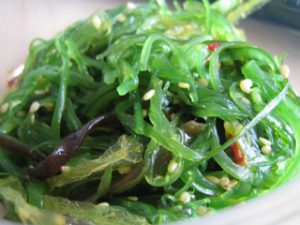
Do you have a thyroid imbalance?
The thyroid gland is located at the base of the throat. The hormones that it produces help to regulate heart rate, metabolic rate, body temperature and weight. The shape of the thyroid gland is like a butterfly, with a right and a left lobe, connected by a piece of tissue. Imbalance in the thyroid gland can result in hyper or hypothyroidism, causing your metabolism to be either too fast (hyperthyroid) or too slow (hypothyroid). Thyroid imbalance can be a potential risk for breast cancer.
The thyroid gland maintains the body’s normal temperature. Enzymes within the whole body work best at a particular temperature and pH. If temperature and pH are not maintained at optimal levels, there will be multiple enzyme deficiencies, and a decrease in the body’s ability to fight cancer cells.
Iodine and Thyroid Function
One of the minerals essential for thyroid function is iodine.
If you have a thyroid gland enlargement, with no autoimmune disease (no Hashimoto’s thyroiditis or Grave’s disease), you may have an iodine deficiency. Replenishing your iodine stores can help reduce thyroid gland enlargement and improve thyroid function when the gland is underactive. A 2016 study published in the International Journal of Food Science and Nutrition found that urinary iodine concentrations are low in 13.2% of women in the U.S., predisposing them to both thyroid imbalance and breast diseases.
The Japanese population has the highest dietary intake of iodine (13 mg per day) due to regular consumption of sea vegetables and fish. The incidence of breast cancer in Japan is about half of what it is in Belgium, France, Denmark, Holland and the US. When Japanese women immigrate and take on the typical western diet with an iodine intake of less than 150 mcg per day, their risk of breast cancer increases.
Iodine improves breast health by assisting in the metabolism of estrogen. Iodine intake can reduce fibrocystic breast disease.
Hashimoto’s Disease and Breast Cancer
Hashimoto’s disease, also called chronic lymphocytic thyroiditis, is the most common cause of hypothyroidism in the United States.1 Hashimoto’s disease is a form of chronic inflammation of the thyroid gland and is an autoimmune disorder. When an individual has Hashimoto’s disease, their immune system attacks the thyroid, causing inflammation and interfering with its ability to produce thyroid hormones. Because this is an autoimmune disorder, iodine supplementation does not usually help, and may make the condition worse.
Breast cancer incidence is significantly higher in women with Hashimoto’s disease than the general population. In women over 49 years of age, the breast cancer frequency is 7.6% when Hashimoto’s disease is present, and only 3.3% when the thyroid is normal. Women with Hashimoto’s disease have more than the double the risk of breast cancer than women with normal thyroid function. (J Endocrinol Invest. 2011 May;34(5):349-52)
Research on Thyroid Imbalance and Breast Cancer
One study has shown that plasma T3 concentrations were reduced significantly in both early and advanced breast cancer, and that TSH levels were elevated in women with advanced breast cancer – both signs of hypothyroidism (Cancer, 1979;43(4): 1434-38)
Another study demonstrated that women with breast cancer were more likely to have autoimmune thyroid disorders than women who were healthy. Antithyroid peroxidase autoantibodies were twice as common in breast cancer patients than in controls. (Eur J Cancer Prev 1996 Dec: 5(6):504-6)
A third study found that the overall prevalence of thyroid disease was 46% in the breast cancer patients studied, versus 14% in a control group (J Clin Endocrinol Metab 1996 Mar;81(3):990-4)
A 2015 study published in the journal Thyroid, found that hypothyroidism and a low level of the thyroid hormone free T4 was related to an increased risk of breast cancer in post-menopausal women. (Thyroid. 2005 Nov;15(11):1253-9)
How to Support Thyroid Function
Consult with a naturopathic doctor to support your thyroid function. Natural substances that may help normalize an underactive thyroid include bee pollen, spirulina or chlorella algae, wheatgrass, oats, watercress, kelp, and the herbs bladderwrack, saw palmetto berries, damiana leaf, guggul, globe artichoke and ashwagandha.
Other nutrients that support the thyroid are the amino acids tyrosine and L-carnitine, and the trace minerals chromium, zinc, copper, selenium and manganese. Some individuals may need bovine dessicated thyroid to normalize thyroid function.
Environmental Chemicals and Thyroid Function
The thyroid gland is vulnerable to environmental chemicals. They can:
- inhibit the ability of the thyroid gland to trap iodine (thiocyanate and perchlorate do this)
- block the binding of iodine and the coupling of iodothyronines to form the thyroid hormones, thyroxine (T4) and triiodothyronine (T3) (sulfonamides, thiourea, methimazole, and aminotriazole do this)
- inhibit thyroid hormone secretion (lithium and an excess of iodine do this)
- increase the metabolism of thyroid hormones so that they are used up faster where they are needed in the body (many drugs do this – phenobarbitol, benzodiazepines, calcium channel blockers, and steroids. PCBs and organochlorine pesticides such as chlordane, DDT, and TCDD do this as well)
Protect Your Thyroid Gland
Protect your thyroid gland from environmental chemicals by eating organic food, avoiding plastics, using a sauna regularly to sweat out environmental chemicals, and using supportive nutrients such as iodine, selenium and tyrosine when appropriate to support thyroid function.
As long as you do not have an autoimmune thyroid disease or an overactive thyroid, consider adding kelp or other seaweeds to your diet to increase iodine availability. Kelp noodles, dulse powder, nori rolls and seaweed salads are easy ways to do this – or take a 500 mg kelp tablet several times a week.



